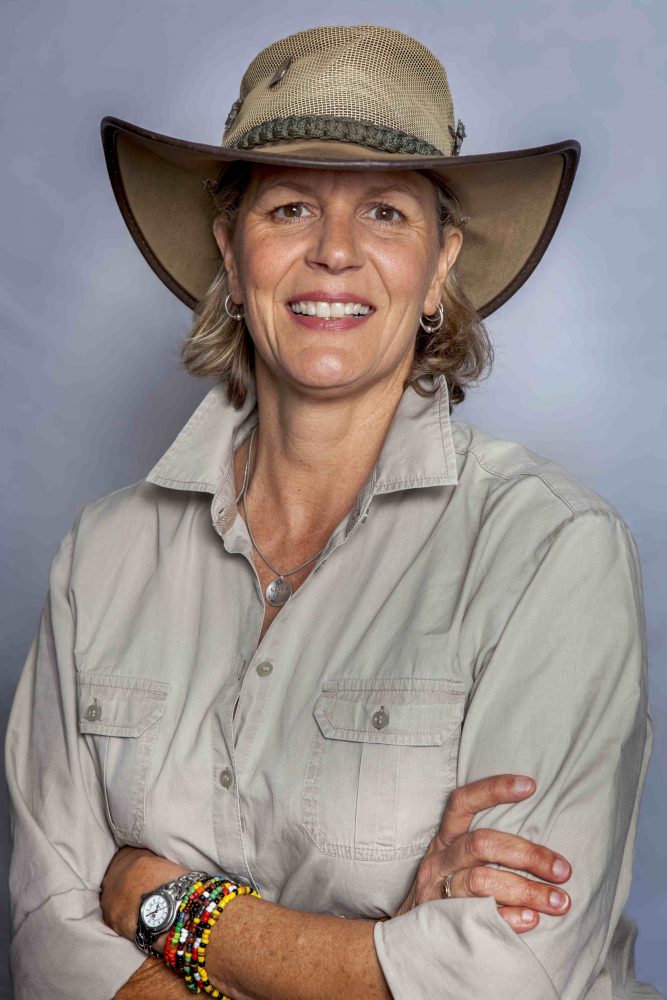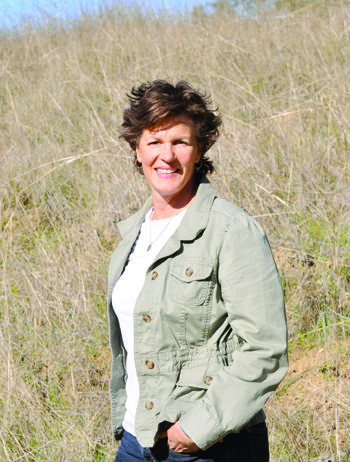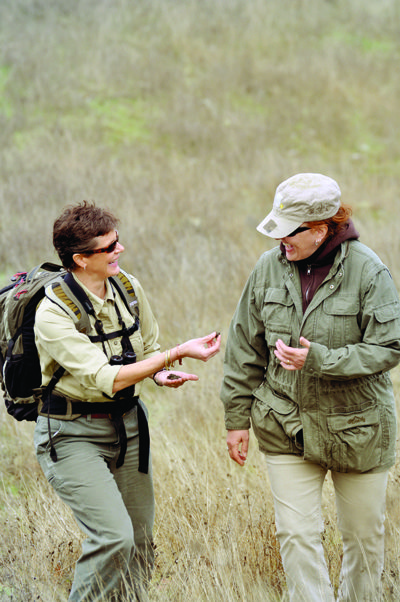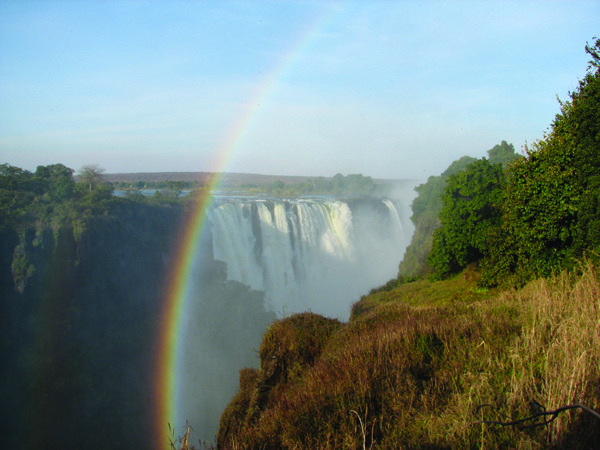Wild Rainbow’s safaris take you into the heart of the world’s most exciting continent.
Africa is a place of fascination for many, especially those who love its iconic spectrum of indigenous wildlife. But lately, lesbians have had reason to rethink this compelling continent: A wave of homophobia is sweeping several African nations, while in others, such as South Africa, LGBT travelers enjoy relative freedom. To help us navigate a once-in-a-lifetime African adventure, we sought out Jody Cole, the owner of Wild Rainbow African Safaris, and asked her to share her story and expertise.
What initially drew you to Africa and what keeps you going back?
As a child, I was drawn to Africa from what I read and saw on TV—watching Mutual of Omaha’s Wild Kingdom, reading Tarzan and the Born Free books. But my favorite book was My Side of the Mountain by Jean Craighead George, where a young boy runs away from home and survives on his own in the wilderness.
I also spent many summer days exploring my grandparents’ plantation in southern Georgia, creating my own wild adventures. That same thrill lives on every time I return to Africa, and I see it in the faces of my guests, as well.
What has Africa taught you? How does it change you?
Life in Africa is immediate and real. There are no buffers between life and death, like there are in this country. My time spent in Africa returns me to a mental and spiritual place that is very old, very primal and very human. Witnessing the cycle of life in the birthplace of humankind is something that resonates with everyone.
It may sound scary, but actually it’s just the opposite. It is a reawakening of the soul. That is the Africa my guests experience and take back with them to enrich their lives in the States.

Jody Cole, Photo by: Cheryl Mazak
Would you share a life-changing moment that happened on a trip?
When I stepped off that very first plane deep in the bush of South Africa, back in 1998—we landed on a green-grass-and-red-soil runway in the middle of nowhere—when I stepped out onto the top step of the ladder to disembark, I immediately recognized the warm, earthy smell. The first time I heard the call of the Cape turtledove and I looked around, I felt I knew this place.
I was at home. Another life-changing moment was while we were canoeing down the Zambezi River that divides Zambia and Zimbabwe. Our guide was steering our canoe while another guest and I were in the front, paddling. The guide warned us about a particularly dangerous pod of hippo around the next bend and told us how to react, should we be charged by the bull. I thought to myself, “This seems simple enough. I mean, how quick can a hippo get to us when they’re on the bank and we have the entire width of the river on our side?” At that very moment, I witnessed another canoe ahead of us panic as a massive form rushed their boat! In seconds, our canoe was in their midst as well.
I began paddling with every fiber of my being to get past these huge creatures. Then it happened. The bull came right for us, rushing so fast he created a huge wave in front of him, his mouth completely agape. I was terrified! I lived to tell the tale, but I noted our guide had unlocked his pistol, ready to shoot if we had been overturned. I became acutely aware of just how precious and tenuous life can be.
As a non-African, white, female guide, you are in a minority. Have you experienced discrimination?
As far as being female—in Africa, if you can pull your own weight, you gain respect from your fellow guides and instructors on that basis alone. Being an American puts me at a disadvantage in that I am not able to spend months on end training in the bush, and I’m sure some of my fellow guides initially wondered if this was just a hobby of mine. Then there’s the discrimination that comes from my race. In Africa, race is discussed openly—and remember, they are only 20-some years out of apartheid. I must say, however, that once I get on the ground, get working, those differences quickly disappear, because although I am a white, female American, I know my stuff right down to the tip of a lion’s tail.
You’re also a philanthropist and human rights activist. With the widespread anti-gay violence in Africa, how do you encourage lesbians to go on a safari?
In America, we often receive a skewed picture of the world outside our borders. Africa is an incredibly huge and diverse continent. Just as if you only heard the news from, say, the Oklahoma Chronicle and thought that was the way all of America was, you hear about the kill-the-gays bill in Uganda or lesbian rape in Soweto and you might believe that is how all of Africa is. In Africa, there are many diverse ideologies.
When you are traveling in third-world countries anywhere in the world, I recommend that my guests respect the culture they are visiting. In turn, I have never experienced any discrimination, nor have I had an incidence of disrespect toward any of my guests due to their nationality, race or sexual orientation. When you are my guest, you are going to experience a level of personal service not often seen in the States. Tourism is often the main source of income for African countries. By and large, the African people are warm, generous and welcoming. In February, I joined the board of the International Gay and Lesbian Human Rights Commission, where I will be engaged in these issues firsthand.
Do you believe the attitude in Africa toward homosexuality will change?
Africans will change their views on homosexuality when the church and her leaders do so. Right now, with the hardships and suffering of the African people due to HIV/AIDS and poverty, there is fertile ground for those who wish us harm to plant the seeds of hate. American religious leaders must shoulder some of the blame for stirring the pot. It is easier to create some outside source to blame for the suffering, instead of laying the blame on the government, the church or outdated beliefs. In just the few years I have been traveling to Africa, access to the internet and outside news sources has moved and continues to move Africa forward, albeit slowly.

Should animal lovers be concerned with any aspects of a safari?
Animal conservation is paramount in Africa; however, I believe the view of animal rights in Africa is built on an experience unlike what we have here in the States. If you are visiting a lodge or bush camp in Africa, whether in a reserve or game park, you are already experiencing the ultimate animal right—the right to roam free.
You will be surrounded by people who are intimately involved in protecting animals and educating others about the web of life that is essential for their survival in the wild. Poaching is a real threat brought on by the poverty and the increasingly large populations in and around the bush areas. Those who are in the tourism business are the very people who exemplify what can be achieved when there is cooperation between people and animals. I choose ground companies with long-standing records, companies that take an active role in animal conservation.
What excites you most about the Grand Peace Parks Safari you’re doing in April?
The Grand Peace Parks Safari is our primary safari for 2011. It is an amazing journey across four countries that are actively participating in opening the migration trails over their borders. This is a unique opportunity for my guests to see a number of countries, including a return to Zimbabwe. This tour in particular puts the animals first and foremost. By following these ancient migration trails, we will be concentrating on animal behavior that has been occurring for thousands of years, was interrupted by international borders and now for the first time will resume.
What feedback have you received from lesbians about your trips?
Lesbians enjoy traveling together, whether they’re in couples or alone. What a safari does is create close bonds through common experiences—the roar of lions in the morning, the direct gaze of an elephant, the sounds of wildebeest herds in the sunset. We love our safari preparations, but once we are there, spending hours together exploring wildlife, then sharing our own stories by firelight that evening—once Africa is in your blood you will never forget the good times and adventures you’ve had while on safari. It truly is the trip of a lifetime, and how better than to share it with one another?

Is a safari for everyone? Is it dangerous?
When you travel with me, I am guiding you all the way. I am very accessible, and after traveling over 30 times to Africa, I’m more than happy to share my experience with you. You deserve to live your dreams and my role is to help you make them a reality. Many travelers are very concerned about their personal safety, their accommodations, down to getting the right shots. One thing I do that no other company does is I hold a pre-trip meeting with my guests, so they can meet one another, have a forum to discuss their concerns and get answers. And when they step off that plane in Africa, I am the first to greet them. It is this personal care that sets Wild Rainbow African Safaris apart.
Are there certain qualities you need to have in order to get the most enjoyment from this experience?
Well, certainly, if you are not interested in the animal kingdom, I’d suggest doing something else! If you mean are there physical barriers—people from all walks of life are going on safari every day. In our personal experience, we had a 99-year-old woman who just returned from Kenya this past summer. I guided a guest with AIDS who had to bring an oxygen tank, someone who needed refrigerated prescription drugs daily, and we went on safari. If you’re vegan, vegetarian, allergic to avocado, all your particular needs can be accommodated. I simply recommend that you bring your imagination with you and keep your mind open. Let Africa do the rest. (wildrainbowsafaris.com)
